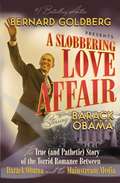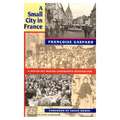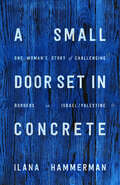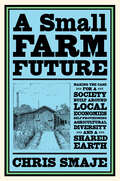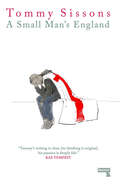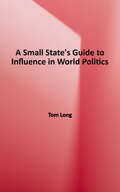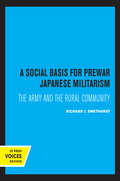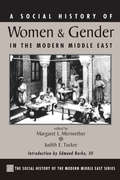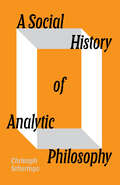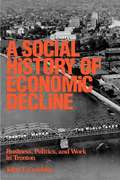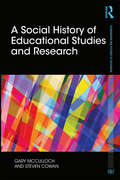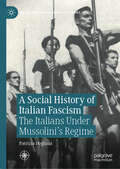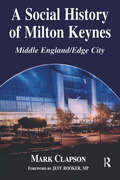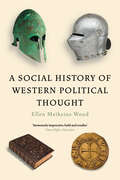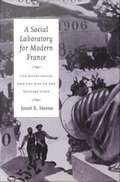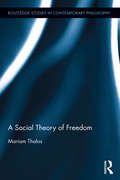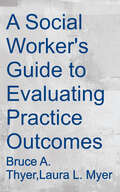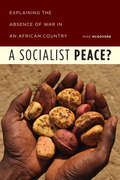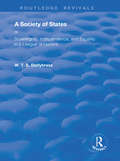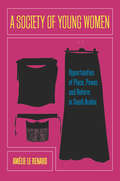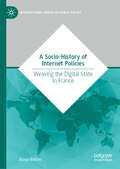- Table View
- List View
A Slobbering Love Affair: The True (and Pathetic) Story of the Torrid Romance Between Barack Obama and the Mainstream Media
by Bernard GoldbergThis Time They Went Beyond Bias. From the day Barack Obama announced his candidacy to the moment he took the oath of office, the mainstream media fawned over him like love-struck school girls. Even worse, this time they went beyond media bias to media activism, says CBS veteran and #1 bestselling author Bernard Goldberg. In his most provocative book yet, A Slobbering Love Affair, Goldberg shows how the mainstream media's hopelessly one-sided coverage of President Obama has shredded America's trust in journalism and endangered our free society. Highlighting the media's laughable coverage and shameless hypocrisy, Goldberg exposes how liberal reporters ignored important issues, focused on trivial matters, and attacked those who dared to question "The One." Goldberg also argues that the media's blatant disregard for their traditional role as the fourth estate and government watchdog has endangered America and eroded the notion of a free and fair press.
A Small Circus: A Novel
by Hans FalladaIt is the summer of 1929, and in a small German town, a storm is brewing.Tredup, a shabby reporter working for the Pomeranian Chronicle, leads a precarious existence . . . until he takes some photographs that offer him a chance to make a fortune.While Tredup contemplates his next move, the town is buzzing. Farmers are plotting their revenge against greedy officials, a mysterious traveling salesman is stirring up trouble, and all the while, the Nazi party grows stronger as the Communists fight them in the street.As the town slowly slips into chaos, Mayor "Fatty” Gareis does everything in his power to seek the easy life.As tensions mount between workers and bosses, town and country, and Left and Right, alliances are broken, bribes are taken, and plots are hatched, until the tension spills over into violence.From the brilliant mind of one of Germany’s most celebrated writers, A Small Circus is a genuine and frightening tale of small-town Germany during a time of unrest. It belongs in the collection of every reader who has enjoyed his break-out classics.Skyhorse Publishing, as well as our Arcade, Yucca, and Good Books imprints, are proud to publish a broad range of books for readers interested in fiction-novels, novellas, political and medical thrillers, comedy, satire, historical fiction, romance, erotic and love stories, mystery, classic literature, folklore and mythology, literary classics including Shakespeare, Dumas, Wilde, Cather, and much more. While not every title we publish becomes a New York Times bestseller or a national bestseller, we are committed to books on subjects that are sometimes overlooked and to authors whose work might not otherwise find a home.
A Small City In France
by Arthur Goldhammer Eugen Weber Françoise GaspardThe picturesque town of Dreux, 60 miles west of Paris, quietly entered history in 1821, when Victor Hugo won the hand of his beloved there. Another century and a half would pass before the town made history again, but this time there was nothing quiet about it. In 1983, Jean-François Le Pen's National Front candidates made a startling electoral gain in the Dreux region. Its liberal traditions had ended abruptly. With the radical right controlling the municipal council and the deputy mayor's office, Dreux became the forerunner of neofascist advances all across the nation. How could it happen? <p><p> A trained historian, Gaspard was born in Dreux and served as the city's socialist mayor from 1977 to 1983. She brings this experience to bear in her study, giving us an evocative picture of the town in all its particularity and at the same time fitting it into the broader context. Local history, collective memory, political life, the role of personality, partisanship, and rumor, the claims of newcomers and oldtimers, Muslims and Catholics: Gaspard sifts through these factors as she crafts a clear and rousing account of the conditions that brought the National Front to power. Viewed amid the explosive consequences of recent demographic and economic transformations, Dreux, with a population of about 30,000, is facing big-city problems: class conflict, unemployment, racism. This is a book about the decline of small-town "virtues" and, more ominously, the democratic ideal in France. With its disturbing implications for other European nations and the United States, it could well be a parable for our time.
A Small Door Set in Concrete: One Woman's Story of Challenging Borders in Israel/Palestine
by Ilana Hammerman“I was taught from the start not to be silent.” For years, renowned activist and scholar Ilana Hammerman has given the world remarkable translations of Kafka. With A Small Door Set in Concrete, she turns to the actual surreal existence that is life in the West Bank after decades of occupation. After losing her husband and her sister, Hammerman set out to travel to the end of the world. She began her trip with the hope that it would reveal the right path to take in life. But she soon realized that finding answers was less important than experiencing the freedom to move from place to place without restriction. Hammerman returned to the West Bank with a renewed joie de vivre and a resolution: she would become a regular visitor to the men, women, and children who were on the other side of the wall, unable to move or act freely. She would listen to their dreams and fight to bring some justice into their lives.A Small Door Set in Concrete is a moving picture of lives filled with destruction and frustration but also infusions of joy. Whether joining Palestinian laborers lining up behind checkpoints hours before the crack of dawn in the hope of crossing into Israel for a day’s work, accompanying a family to military court for their loved one’s hearing, or smuggling Palestinian children across borders for a day at the beach, Hammerman fearlessly ventures into territories where few Israelis dare set foot and challenges her readers not to avert their eyes in the face of injustice. Hammerman neither preaches nor politicks. Instead, she engages in a much more personal, everyday kind of activism. Hammerman is adept at revealing the absurdities of a land where people are stripped of their humanity. And she is equally skilled at illuminating the humanity of those caught in this political web. To those who have become simply statistics or targets to those in Israel and around the world, she gives names, faces, dreams, desires. This is not a book that allows us to sit passively. It is a slap in the face, a necessary splash of cold water that will reawaken the humanity inside all of us.
A Small Farm Future: Making the Case for a Society Built Around Local Economies, Self-Provisioning, Agricultural Diversity and a Shared Earth
by Chris SmajeIn a time of looming uncertainties, what would a truly resilient society look like? In a groundbreaking debut, farmer and social scientist Chris Smaje argues that organising society around small-scale farming offers the soundest, sanest and most reasonable response to climate change and other crises of civilisation—and will yield humanity’s best chance at survival. Drawing on a vast range of sources from across a multitude of disciplines, A Small Farm Future analyses the complex forces that make societal change inevitable; explains how low-carbon, locally self-reliant agrarian communities can empower us to successfully confront these changes head on; and explores the pathways for delivering this vision politically. Challenging both conventional wisdom and utopian blueprints, A Small Farm Future offers rigorous original analysis of wicked problems and hidden opportunities in a way that illuminates the path toward functional local economies, effective self-provisioning, agricultural diversity and a shared earth.
A Small Farm Future: Making the Case for a Society Built Around Local Economies, Self-Provisioning, Agricultural Diversity and a Shared Earth
by Chris SmajeA modern classic of the new agrarianism"Chris Smaje...shows that the choice is clear. Either we have a small farm future, or we face collapse and extinction."—Vandana Shiva"Every young person should read this book."—Richard HeinbergIn a groundbreaking debut, farmer and social scientist Chris Smaje argues that organizing society around small-scale farming offers the soundest, sanest and most reasonable response to climate change and other crises of civilisation—and will yield humanity&’s best chance at survival.Drawing on a vast range of sources from across a multitude of disciplines, A Small Farm Future analyses the complex forces that make societal change inevitable; explains how low-carbon, locally self-reliant agrarian communities can empower us to successfully confront these changes head on; and explores the pathways for delivering this vision politically.Challenging both conventional wisdom and utopian blueprints, A Small Farm Future offers rigorous original analysis of wicked problems and hidden opportunities in a way that illuminates the path toward functional local economies, effective self-provisioning, agricultural diversity and a shared earth.Perfect for readers of both Wendell Berry and Thomas Piketty, A Small Farm Future is a refreshing, new outlook on a way forward for society—and a vital resource for activists, students, policy makers, and anyone looking to enact change.
A Small Man's England
by Tommy SissonsAn exploration of white working-class English men, showing how and why some have been captured by the far-right and what the left can do about it.IS THE WHITE WORKING CLASS RIGHT-WING? AND IS IT RIGHT-WING TO EVEN SPEAK OF A "WHITE WORKING CLASS"? In recent decades, as class consciousness has been suppressed and eroded, many white working-class men have turned their backs on the left in favour of the right and the far-right. Why is this? A Small Man's England is a polemic aimed at the structures of hierarchy that ceaselessly maintain power across Britain and elsewhere, and a call for multicultural solidarity amongst the working class. In analysing the roles that class, race, masculinity and nationality play in neoliberal Britain, Sissons offers a solution to the indoctrination of white working-class English men by the right and the far-right, and explores how working-class people can collectively shape a "Common England" -- a country based on equality and justice for all.
A Small State's Guide to Influence in World Politics
by Tom LongA complete guide for how small states can be strikingly successful and influential--if they assess their situations and adapt their strategies. Small states are crucial actors in world politics. Yet, they have been relegated to a second tier of International Relations scholarship. In A Small State's Guide to Influence in World Politics, Tom Long shows how small states can identify opportunities and shape effective strategies to achieve their foreign policy goals. To do so, Long puts small states' relationships at the center of his approach. Although small states are defined by their position as materially weaker actors vis-a-vis large states, Long argues that this condition does not condemn them to impotence or irrelevance. Drawing on typological theory, Long builds an explanation of when and how small states might achieve their goals. The book assesses a global range of cases successes and failures and offers a set of tools for scholars and policymakers to understand how varying international conditions shape small states' opportunities for influence.
A Social Basis for Prewar Japanese Militarism: The Army and the Rural Community (Publications of the Center for Japanese and Korean Studies)
by Richard J. SmethurstThis title is part of UC Press's Voices Revived program, which commemorates University of California Press’s mission to seek out and cultivate the brightest minds and give them voice, reach, and impact. Drawing on a backlist dating to 1893, Voices Revived makes high-quality, peer-reviewed scholarship accessible once again using print-on-demand technology. This title was originally published in 1984.
A Social Dreaming Experience at the Time of COVID 19 (New Paradigms in Healthcare)
by Elisabetta Pasini Cinzia TrimboliThe book describes the experience of four Social Dreaming Matrices held online between March and May 2020, during the first lockdown caused by the Covid 19 emergency. The pandemic isolated us and imposed prolonged contact with ourselves and our solitary thoughts. Against this backdrop, there was hope for change, a desire for a different kind of sociability and different forms of intimacy. On the basis of this evidence, our research supports the shift "from experiencing trauma to reacting to trauma", looking at a collective traumatic experience not only as something to be overcome but as an opportunity for a transformation that changes our mental schemes in relation to the external context. We have identified Social Dreaming as a privileged technique to overcome a collective traumatic experience, supporting its elaboration through collective feelings, new connections between intuition and rational thought, the discovery of community meanings. The authors's thesis is that the much-needed transition from 'magical thinking' to 'transformative thinking' takes place in a setting that is able to contain the anxieties of life's transitional phases, supporting the creation of new rituals and new social bonds and sustaining the passage from “me” to a “wider we”.
A Social History Of Women And Gender In The Modern Middle East (Social History Of The Modern Middle East Ser.)
by Margaret Lee MeriwetherSynthesizing the results of the extensive research on women and gender done over the last twenty years, Margaret Meriwether and Judith Tucker provide an accessible overview of the scholarship on women and gender in the nineteenth- and twentieth-century Middle East. The book is organized along thematic lines that reflect major focuses of research in this areagender and work, gender and the state, gender and law, gender and religion, and feminist movementsand each chapter is written by a scholar who has done original research on the topic. }In this important new work, Margaret Meriwether and Judith Tucker synthesize and make accessible the results of the extensive research on women and gender done over the last twenty years. Using new theoretical approaches and methodologies as well as nontraditional sources, scholars studying women and gender issues in Middle Eastern societies have made great progress in shedding light on these complex subjects. A Social History of Women and Gender in the Modern Middle East provides an overview of this scholarship on women and gender in the nineteenth- and twentieth-century Middle East.The book is organized along thematic lines that reflect major focuses of research in this areagender and work, gender and the state, gender and law, gender and religion, and feminist movementsand each chapter is written by a scholar who has done original research on the topic. Although structured around the individual authors own work, the chapters also include overviews and assessments of other research, highlights of ongoing debates and key issues, and comparisons across regions of the Middle East. An insightful introduction centers the various chapters around key theoretical, methodological, and historical issues and makes connections with other areas of social historical research on the Middle East and with research on gender and womens history in other parts of the world. Although there are many studies available on women and gender, A Social History of Women and Gender in the Modern Middle East provides a breadth of coverage and assessment of the field that is not found elsewhere. }
A Social History of Analytic Philosophy
by Christoph SchuringaHow a supposedly apolitical form of philosophy owes its continuing power to social and political forcesAnalytic philosophy is the leading form of philosophy in the English-speaking world. What explains its continued success? Christoph Schuringa argues that its enduring power can only be understood by examining its social history. Analytic philosophy tends to think of itself as concerned with eternal questions, transcending the changing scenes of history. It thinks of itself as apolitical. This book, however, convincingly shows that the opposite is true.The origins of analytic philosophy are in a set of distinct movements, shaped by high-ly specific sets of political and social forces. Only after the Second World War were these disparate, often dynamic movements joined together to make &‘analytic philosophy&’ as we know it. In the climate of McCarthyism, analytic philosophy was robbed of political force.To this day, analytic philosophy is the ideology of the status quo. It may seem arcane and largely removed from the real world, but it is a crucial component in upholding liberalism, through its central role in elite educational institutions. As Schuringa concludes, the apparently increasing friendliness of analytic philosophers to rival approaches in philosophy should be understood as a form of colonization; thanks to its hegemonic status, it reformats all it touches in service of its own imperatives, going so far as to colonize decolonial efforts in the discipline.
A Social History of Economic Decline: Business, Politics, and Work in Trenton
by John T. CumblerBusiness, Politics, and Work in Trenton (Class & Culture)
A Social History of Educational Studies and Research: Past, Present – and Future? (Foundations and Futures of Education)
by Steven Cowan Gary McCullochA Social History of Educational Studies and Research examines the development of the study of education in the UK in its broader educational, social and political context since its early beginnings in the first part of the twentieth century. By providing a historical analysis of the contested growth of the field this book examines the significant contribution that has been made by institutions of higher education, journals, text books, conferences, centres, and academic societies. It discusses the problems and opportunities of the field, and its prospects for survival and adaptation to current changes in the decades ahead. The work draws on documentary sources, social network analysis, and interviews with leading figures from across the field. This book highlights international influences on the development of educational studies and research in the UK, its role in the growing internationalisation of the field as a whole, and also comparisons and contrasts with the nature of the field elsewhere. It relates the development to the wider social, political and economic changes affecting higher education in general and educational studies and research in particular. It addresses the historical development of disciplines in higher education institutions and the nature, extent and limitations of interdisciplinarity. A Social History of Educational Studies and Research discuss the problems and opportunities facing the study of education today, and its prospects of adapting to changes in the decades ahead. It is a distinctive and original analysis of educational studies and research that provides the first comprehensive study of its type.
A Social History of France, 1789–1914
by Peter McpheeThis volume provides a lively and authoritative synthesis of recent work on the social history of France and is now thoroughly updated to cover the 'long nineteenth century' from 1789-1914. Peter McPhee offers both a readable narrative and a distinctive, coherent argument about this remarkable century and explores key themes such as: - peasant interaction with the environment - the changing experience of work and leisure - the nature of crime and protest - changing demographic patterns and family structures - the religious practices of workers and peasants - the ideology and internal repercussions of colonisation. At the core of this social history is the exercise and experience of 'social relations of power' - not only because in these years there were four periods of protracted upheaval, but also because the history of the workplace, of relations between women and men, adults and children, is all about human interaction. Stimulating and enjoyable to read, this indispensable introduction to nineteenth-century France will help readers to make sense of the often bewildering story of these years, while giving them a better understanding of what it meant to be an inhabitant of France during that turbulent time.
A Social History of Italian Fascism: The Italians Under Mussolini’s Regime (Italian and Italian American Studies)
by Patrizia DoglianiThis book uncovers how fascism reshaped Italian society according to its ideological and historical interpretation of the Italian nation and people and identifies the strengths of this transformation, but also the resistance encountered from, for example, women and minority groups, to accept it in everyday life. It analyzes the success achieved by some policies aimed at popular masses in order to integrate them into the nation, and how fascism initiated an early welfare state project to address specific categories of society such as veterans, families, mothers and children. The book also questions the concept and practices of social citizenship reserved only for those who gave evidence of formal adherence to fascism.
A Social History of Milton Keynes: Middle England/Edge City (British Politics and Society)
by Mark ClapsonEstablished in 1967, Milton Keynes is England's largest new city and one of the fastest-growing urban areas in the UK. It is also a suburban city, genuinely liked and appreciated by most of its citizens.For many reasons, however, Milton Keynes is misunderstood, and its valuable recent lessons are mostly ignored in debates about national urban policy. This book discusses the popular and intellectual prejudices that have distorted understandings of the new city. A city is nothing without its people, of course, so Mark Clapson looks at who has moved to Milton Keynes, and discusses their experiences of settling in. He also confronts the common myth of the new city's soullessness with an account of community and association that emphasizes the strength of social interaction there.
A Social History of Western Political Thought
by Ellen Meiksins WoodA sweeping and nuanced materialist history of Western political thoughtIn this groundbreaking work, Ellen Meiksins Wood rewrites the history of political theory, from Plato to Rousseau. Treating canonical thinkers as passionately engaged human beings, Wood examines their ideas not simply in the context of political languages but as creative responses to the social relations and conflicts of their time and place. She identifies a distinctive relation between property and state in Western history and shows how the canon, while largely the work of members or clients of dominant classes, was shaped by complex interactions among proprietors, labourers and states. Western political theory, Wood argues, owes much of its vigour, and also many ambiguities, to these complex and often contradictory relations. In the first volume, she traces the development of the Western tradition from classical antiquity through to the Middle Ages in the perspective of social history—a significant departure not only from the standard abstract history of ideas but also from other contextual methods. From the Ancient Greek polis of Plato, Aristotle, Aeschylus and Sophocles, through the Roman Republic of Cicero and the Empire of St Paul and St Augustine, to the medieval world of Averroes, Thomas Aquinas and William of Ockham, Wood offers a rich, dynamic exploration of thinkers and ideas that have indelibly stamped our modern world. In the second volume, Wood addresses the formation of the modern state, the rise of capitalism, the Renaissance and Reformation, the scientific revolution and the Age of Enlightenment, which have all been attributed to the &“early modern&” period. Nearly everything about its history remains controversial, but one thing is certain: it left a rich and provocative legacy of political ideas unmatched in Western history. The concepts of liberty, equality, property, human rights and revolution born in those turbulent centuries continue to shape, and to limit, political discourse today. Assessing the work and background of figures such as Machiavelli, Luther, Calvin, Spinoza, the Levellers, Hobbes, Locke and Rousseau, Ellen Wood vividly explores the ideas of the canonical thinkers, not as philosophical abstractions but as passionately engaged responses to the social conflicts of their day.
A Social Laboratory for Modern France: The Musée Social & the Rise of the Welfare State
by Janet R. HorneAs a nineteenth-century think tank that sought answers to France's pressing "social question," the Musée Social reached across political lines to forge a reformist alliance founded on an optimistic faith in social science. In A Social Laboratory for Modern France Janet R. Horne presents the story of this institution, offering a nuanced explanation of how, despite centuries of deep ideological division, the French came to agree on the basic premises of their welfare state. Horne explains how Musée founders believed--and convinced others to believe--that the Third Republic would carry out the social mission of the French Revolution and create a new social contract for modern France, one based on the rights of citizenship and that assumed collective responsibility for the victims of social change. Challenging the persistent notion of the Third Republic as the stagnant backwater of European social reform, Horne instead depicts the intellectually sophisticated and progressive political culture of a generation that laid the groundwork for the rise of a hybrid welfare system, characterized by a partnership between private agencies and government. With a focus on the cultural origins of turn-of-the-century thought--including religion, republicanism, liberalism, solidarism, and early sociology--A Social Laboratory for Modern France demonstrates how French reformers grappled with social problems that are still of the utmost relevance today and how they initiated a process that gave the welfare state the task of achieving social cohesion within an industrializing republic.
A Social Theory of Freedom (Routledge Studies in Contemporary Philosophy)
by Mariam ThalosIn A Social Theory of Freedom, Mariam Thalos argues that the theory of human freedom should be a broadly social and political theory, rather than a theory that places itself in opposition to the issue of determinism. Thalos rejects the premise that a theory of freedom is fundamentally a theory of the metaphysics of constraint and, instead, lays out a political conception of freedom that is closely aligned with questions of social identity, self-development in contexts of intimate relationships, and social solidarity. Thalos argues that whether a person is free (in any context) depends upon a certain relationship of fit between that agent’s conception of themselves (both present and future), on the one hand, and the facts of their circumstances, on the other. Since relationships of fit are broadly logical, freedom is a logic—it is the logic of fit between one’s aspirations and one’s circumstances, what Thalos calls the logic of agency. The logic of agency, once fleshed out, becomes a broadly social and political theory that encompasses one’s self-conceptions as well as how these self-conceptions are generated, together with how they fit with the circumstances of one’s life. The theory of freedom proposed in this volume is fundamentally a political one.
A Social Worker's Guide To Evaluating Practice Outcomes
by Bruce A. Thyer Laura L. MyersHow do we determine the outcomes of social work services? Thyer and Myers have written an easy-to-read primer on the topic of empirically evaluating the outcomes of social work practice. This resource, for social work students, graduate and undergraduate, and for social work practitioners, presents outcome studies using both group-research and single-case designs. Unlike other books dealing with the topic of evaluating practice, which use theoretical cases, Thyer and Myers use real-life examples of evaluating social work practice, ranging from those fairly low on the scale of internal validity to those that are pretty rigorous. The book begins with a refresher on evaluation research, provides a balanced approach to both single-system and group-evaluation designs, and closes with a discussion of ethical issues, myths, misconceptions, and practical considerations in evaluation. Council on Social Work Education We are a nonprofit national association representing individual members and graduate and undergraduate programs of professional social work education. Founded in 1952, this partnership of educational and professional institutions, social welfare agencies, and private citizens is recognized by the Council for Higher Education Accreditation as the sole accrediting agency for social work education in this country.
A Socialist Peace?: Explaining the Absence of War in an African Country
by Mike McgovernFor the last twenty years, the West African nation of Guinea has exhibited all of the conditions that have led to civil wars in other countries, and Guineans themselves regularly talk about the inevitability of war. Yet the country has narrowly avoided conflict again and again. In A Socialist Peace?, Mike McGovern asks how this is possible, how a nation could beat the odds and evade civil war. Guinea is rich in resources, but its people are some of the poorest in the world. Its political situation is polarized by fiercely competitive ethnic groups. Weapons flow freely through its lands and across its borders. And, finally, it is still recovering from the oppressive regime of Sékou Touré. McGovern argues that while Touré’s reign was hardly peaceful, it was successful—often through highly coercive and violent measures—at establishing a set of durable national dispositions, which have kept the nation at peace. Exploring the ambivalences of contemporary Guineans toward the afterlife of Touré’s reign as well as their abiding sense of socialist solidarity, McGovern sketches the paradoxes that undergird political stability.
A Society of States: Or, Sovereignty, Independence, and Equality in a League of Nations (Routledge Revivals)
by W. T. StallybrassThe idea of a League of Nations has now taken firm root. The spade-work has been done. Leading statesmen of every country, in eloquent and glowing words, have proclaimed their adherence to the movement for its constitution after the war. It has extorted even the tribute paid to vice—hypocrisy. The seed has been sown. What manner of fruit it will bear will depend upon the knowledge and patience and care with which it is tended in its early growth.
A Society of Young Women: Opportunities of Place, Power, and Reform in Saudi Arabia
by Amélie Le RenardThe cities of Saudi Arabia are among the most gender segregated in the world. In recent years the Saudi government has felt increasing international pressure to offer greater roles for women in society. Implicit in these calls for reform, however, is an assumption that the only "real" society is male society. Little consideration has been given to the rapidly evolving activities within women's spaces. This book joins young urban women in their daily lives—in the workplace, on the female university campus, at the mall—to show how these women are transforming Saudi cities from within and creating their own urban, professional, consumerist lifestyles. As young Saudi women are emerging as an increasingly visible social group, they are shaping new social norms. Their shared urban spaces offer women the opportunity to shed certain constraints and imagine themselves in new roles. But to feel included in this peer group, women must adhere to new constraints: to be sophisticated, fashionable, feminine, and modern. The position of "other" women—poor, rural, or non-Saudi women—is increasingly marginalized. While young urban women may embody the image of a "reformed" Saudi nation, the reform project ultimately remains incomplete, drawing new hierarchies and lines of exclusion among women.
A Socio-History of Internet Policies: Weaving the Digital State in France (International Series on Public Policy)
by Anne BellonThis book examines the development of internet policymaking over the last forty years. Drawing on evidence from France and elsewhere, it adopts a sociohistorical perspective to offer insights into the ways democratic states regulate the internet and digital transformation more generally. Adopting a chronological approach and utilising both policy analysis and interviews with key actors, it retells the changing role of the state in internet regulation since the inception of the internet to the present day. It also explores the complex relationships between public administrations and internet organizations, and considers whether states are really capable of governing the digital space. It will appeal to all those interested in public policy, digital studies, sociology and communication studies.
